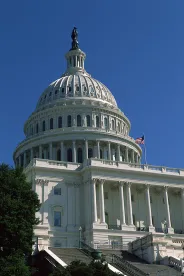On March 16, 2020, the U.S. House of Representatives approved new legislative text for the emergency coronavirus bill. The amendments to the “Families First Coronavirus Response Act,” (H.R. 6201) were intended to correct drafting errors that occurred while the House cobbled together its coronavirus bill over the weekend.
Turning to the new legislative text, the bill structure is largely the same as the bill that passed the House on Saturday, March 14, 2020. Major concepts and aspects—such as the “fewer than 500 employees”—threshold remain. Below are the significant changes to the bill:
Emergency FMLA Leave
- Paid leave under the Family and Medical Leave Act (FMLA) is now only available for the sole purpose of caring for children who are home due to school or daycare closures.
- This is paid at two-thirds of the regular rate, and there is now a cap of $200 per day per employee and $10,000 in the aggregate.
- Employers who are health care providers or emergency responders are not required to comply. (Note that the bill does not define these terms).
Emergency Paid Sick Leave
- “Full pay” compensation up to 80 hours is capped at $511 per day per employee and $5,110 in the aggregate (to take “personal” sick leave) and $200 per day per employee and $2,000 in aggregate (to care for a family member).
- Employers who are health care providers or emergency responders are not required to comply. (Note that the bill does not define these terms.)
What’s Next?
The House Bill’s Prospects in the Senate
The Senate has cleared its decks so it can immediately address a final House-passed bill. Over the weekend, there were positive indications that the Senate would pass the bill, as House Republicans and President Donald Trump provided political cover for Senate Republicans to vote “yes.” Senator Mitch McConnell sounded optimistic that the bill would make it through the Senate.
However, now that Senators and their staffs have had an opportunity to digest the bill, there seems to be at least some growing dissension within Senate Republican ranks. In particular, some Republicans are concerned about the bill’s impact on small businesses, and tax credits for employers (to offset the costs of providing paid leave) are unlikely to help. A coalition of approximately 75 business associations sent a letter to the Senate asking that any bill received from the House be amended to fund any paid leave requirements via the Social Security Administration or through unemployment insurance. Republicans may also be wary of enacting even temporary paid leave benefits, as it could lay the groundwork for creating a more permanent program.
What About Large Employers?
Currently, legislation intended to cover large employers does not seem to be in the works. However, President Trump has suggested that the Senate may add a paid sick leave requirement for business with 500 or more employees.




 />i
/>i

